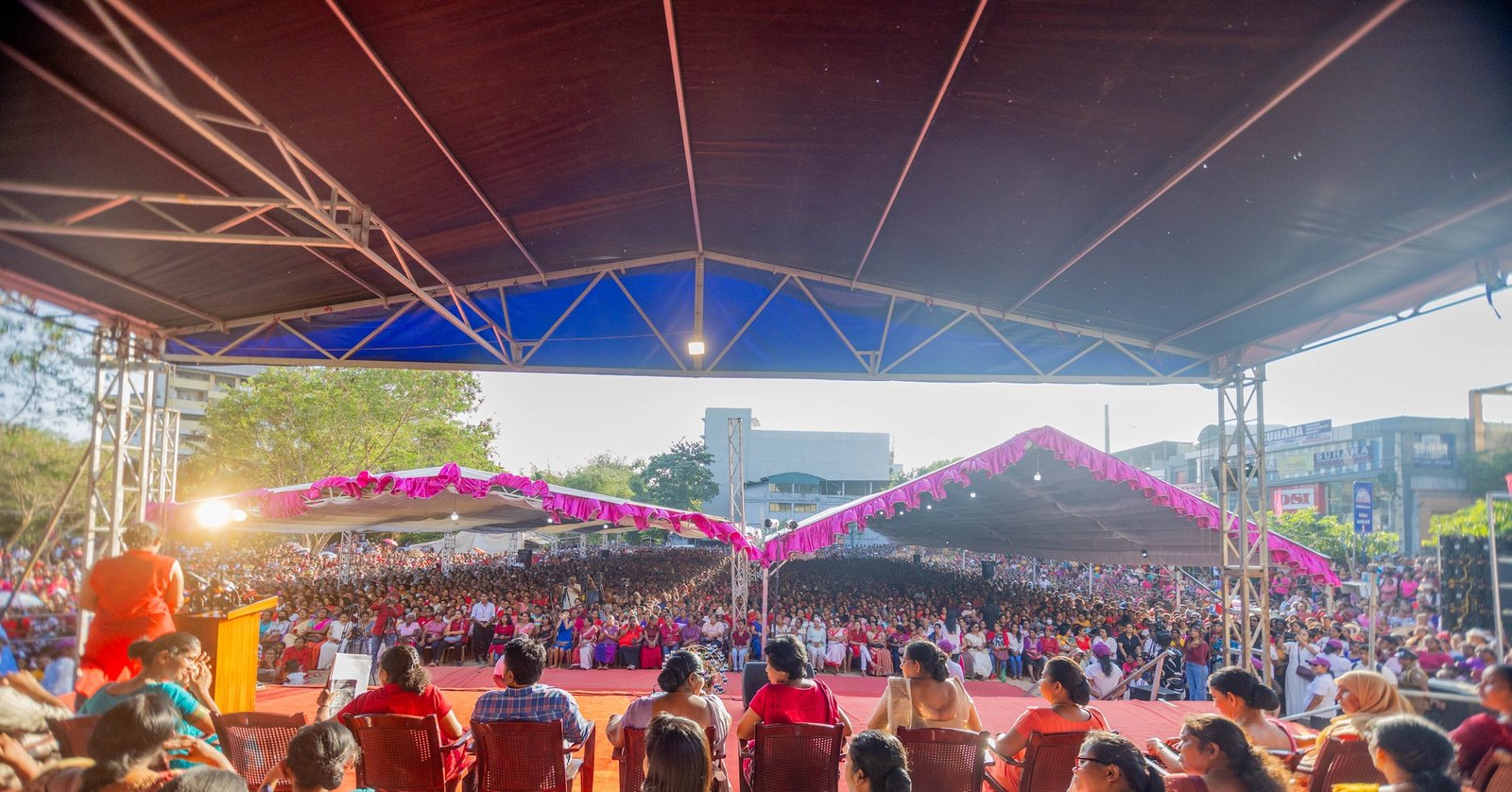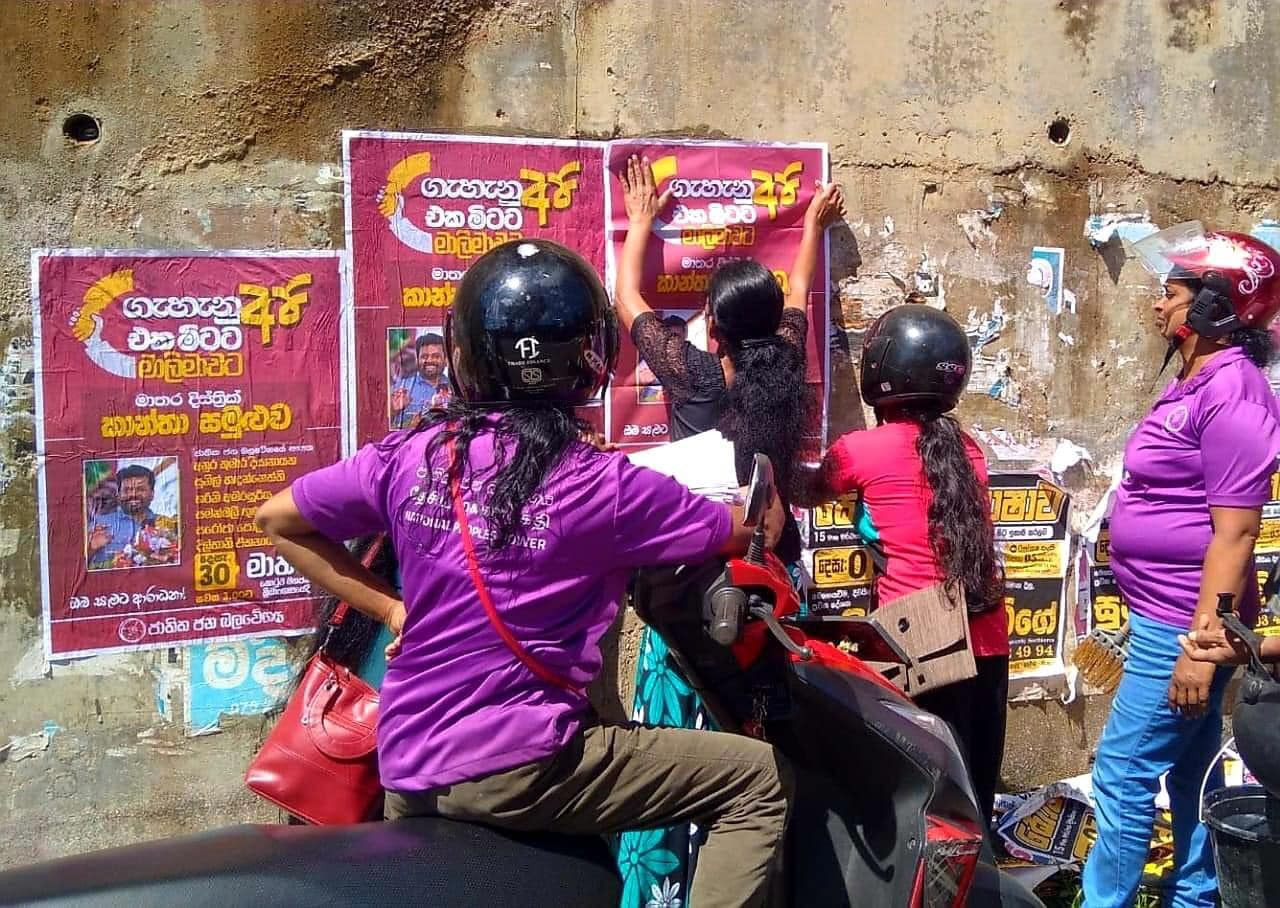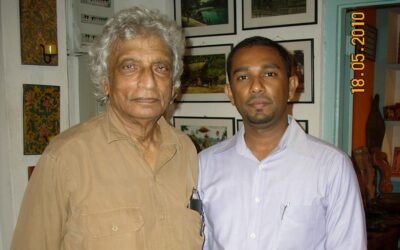Gehenu Api Eka Mitata: Building a Women’s Political Movement in Sri Lanka
Kaushalya Ariyarathne
The recent election of 22 women to Sri Lanka’s new parliament in November 2024 has sparked significant interest and inquiry. This development, representing a welcome doubling of female representation compared to previous parliaments, has naturally led many people, researchers, and organisations to seek insights into the strategies and mechanisms behind this notable increase. While the numerical achievement is undoubtedly significant and a cause for optimism, our consistent response emphasises that the parliamentary count represents only one facet of a broader, more complex struggle to enhance women’s political participation by left feminists.
Central to this increase in the number of women in parliament has been the emergence and growth of the Gehenu Api Eka Mitata (‘Women, We Are One’) movement inaugurated by the Progressive Women’s Collective (PWC), the women’s wing of the National People’s Power (NPP). It is precisely because this movement is the first of its kind in Sri Lanka that recording its experiences, strategies, challenges, and early impacts becomes not just valuable, but essential. Such documentation captures a potentially transformative moment and offers potential lessons for future efforts aimed at enhancing gender equality and equity in Sri Lankan governance.
However, this attempt to record this movement’s journey at this juncture must be understood with necessary caution and acknowledge inherent limitations. Firstly, as a member of the NPP and a participant within the movement itself, I carry my own perspectives and potential biases. Therefore, while offering initial reflections, I strongly advocate for more comprehensive, objective assessments by independent researchers or scholars in the future. Secondly, the timeframe remains a critical constraint. With the new parliament having been seated only one year ago and the Gehenu Api Eka Mitata movement itself being approximately three to four years old, it is simply too early to draw definitive conclusions about long-term sustainability, deep institutional change, or the ultimate effectiveness of all strategies employed. Future research, conducted after more time has elapsed, will be far better positioned to assess the lasting legacy of this current surge in women’s representation and the movement’s role in shaping it, potentially rectifying any premature assessments made at this early stage. This initial evaluation, therefore, should be viewed as a foundational snapshot, inviting deeper, more rigorous investigation as the story continues to unfold.
Progressive Women’s Collective
Our journey began in late 2018 with the formation of the NPP and the establishment of the Progressive Women’s Collective (PWC)[1] as its dedicated women’s wing. From the outset, we embarked on a crucial process of collective reflection, seeking to deeply understand the existing landscape and the formidable challenges facing women in Sri Lankan politics. What we witnessed was a stark paradox: despite the near-universal presence of women’s wings across political parties, the central corridors of power, the party committees, and decision-making bodies, remained overwhelmingly dominated by men.
The 2016 amendment to the Local Government Elections Act, mandating a compulsory 25% female nomination quota, had initially seemed like a beacon of hope. However, our lived experience revealed how access within political parties was severely restricted for women, transcending party lines. We sensed a palpable hesitation among many women towards engaging in politics, frequently attributed to the widely perceived violent and antagonistic nature of Sri Lankan political spaces. Compounding this was the crushing financial burden of electoral campaigns, a tough obstacle that we recognised would disproportionately impact women, who often have less access to independent resources and networks of wealth. Further, deeply ingrained gender roles and attitudes, dictating what was deemed ‘appropriate’ for women, created pervasive structural barriers. This was the essential, often painful, foundation upon which we knew we had to build the Gehenu Api Eka Mitata movement.
Grounded in the understanding that our movement must operate as a praxis (a form of practice deeply informed by theory) we identified two central pillars to guide our vision and action. The first foundation was unpaid care work, which we recognise as a cornerstone of the NPP’s economic strategy. By foregrounding care work, which is often invisible, undervalued, and predominantly carried out by women, we aimed to reimagine the economy around the principles of social reproduction, equity, and collective well-being. For this, we drafted a position paper for internal use. The second foundation was intersectionality, which broadens our framework for justice and equality. This perspective acknowledges that people experience oppression and privilege through multiple, overlapping identities, such as gender, class, ethnicity, sexuality, disability, and region, and thus pushes us to design strategies and policies of the NPP that address these interconnected realities. Together, these two principles ensured that our movement is not only rooted in critical analysis but also oriented toward transformative, inclusive, and equitable social change.
Village and district women’s councils
Our actions began with establishing electorate-level women’s committees across the country; Kānthā Kottāsha Sabhās (Women’s Divisional Councils), in which all key leadership positions including chairperson, secretary, treasurer, and council members are held exclusively by women. We, as the members of the Central Committee of the NPP, organised island wide workshops for selected women in each district on our key themes, who went back to their electorates and did similar training and initiated discussions amongst these Kottāsha Sabhās. These workshops formed a crucial part of the party’s broader women’s empowerment strategy. They focused on unpacking the political aspects of the political economy of gender and sexuality, while also exploring how women’s political engagement intersects with economic structures, exploitation, violence, and discrimination.
Following these sessions, these committees were strengthened through the formation of district women’s executive committees, each led by elected women leaders. Together, these interconnected networks of local and district committees demonstrate the extensive organisational groundwork laid by the NPP to build a strong, gender inclusive political movement. Given that grassroots organising within the NPP had been largely male-dominated, a parallel awareness program was introduced and implemented across all NPP organising committees. District women’s committees organised women’s rallies in every district, widely covered by the media and marked by the participation of thousands of women. However, these rallies represented only the public culmination of a much longer process – the result of two years of sustained groundwork and organising that took place behind the scenes.

A campaign beyond elections
It is important to emphasise that the NPP’s agenda extends well beyond the electoral participation of women. Its aim is to cultivate a cadre of women who remain actively engaged in political discourse beyond elections, equipped with a deep understanding of the socio-economic and cultural complexities shaping broader political realities. Traditionally, women’s participation in political meetings has been limited to subsidiary or supportive roles, while men have occupied positions of central authority.
In contrast, a notable shift has emerged within Kānthā Kottāsha Sabhās, where men now participate actively and collaboratively. Many also take on household and caregiving responsibilities to enable women to attend meetings and contribute to discussions that often extend late into the night. This trend went beyond a superficial reversal of gender roles, since it reflected a voluntary and conscious redistribution of labour, fostered through the NPP’s awareness programmes on unpaid care work, which have encouraged both women and men to rethink and reshape traditional gender norms in politics.
For example, our meetings and rallies were not just about the agenda; they were meticulously planned spaces. We always dedicated significant discussion to the practical realities: ensuring mothers could bring their children, setting respectful end times, guaranteeing safe transport home, and securing adequate, accessible toilet facilities, etc. The noticeable presence of women participating in district rallies with their children serves as a significant indicator of the belief that NPP political spaces are inclusive and non-violent.
“A fair society, a free country, a free woman!” was the NPP women’s 2024 electoral campaign slogan. In its electoral strategy, the NPP adopted a collective campaign fund, ensuring that financial barriers did not limit participation. This approach particularly benefited underprivileged candidates, including many women who often face economic constraints in running campaigns, thereby promoting a more equitable and inclusive political process. In the 2025 local government elections, we succeeded in including more women candidates on the contesting lists than the required quota. Importantly, these women were not merely party nominees, but candidates who secured their seats through their own electoral victories.
Challenges in sustaining organising and capacity-building
Having 20 women in parliament from the NPP without family-based political legacies is a hard-won achievement, especially considering Sri Lanka’s political history, where most women who entered parliament did so through established family or dynastic connections. With a larger number of women now in parliament, our visibility and influence has expanded across multiple spheres. We have seen women assume leadership positions, including that of a prime minister, and enter previously male-dominated arenas such as finance committees and other decision-making bodies within parliament. Moreover, women’s voices are increasingly present in mainstream political dialogues and media platforms, where they not only engage in policy discussions but also challenge conservative norms, including traditional dress codes that have long defined women’s public visibility. However, it is equally recognised that this number should be progressively increased by ensuring the inclusion of more capable women in future parliaments, a goal that requires deliberate and sustained efforts in organisation and capacity-building.
Following the 2024 elections, the movement has encountered challenges in broadening its organisational capacity on the ground, as a number of its founding leaders and activists have taken on governmental or elected roles. Nevertheless, we have responded by decentralising organising arms, attempting to build a new generation of organisers comprising youth, and emphasising political education to sustain its grassroots energy. Given the prevalence of online bullying and harassment directed at women members of parliament, largely through social media platforms, encouraging young women to pursue political careers has become an increasingly difficult challenge. Although balancing the demands of governance and activism have placed considerable strain on members of the national legislature and local government bodies, continued initiatives in cadre-building and community-level organising are necessary for the movement to preserve its momentum in mobilisation and ideological work.
Furthermore, transforming the deeply entrenched masculine culture of parliament remains an ongoing struggle. Parliamentary debates often privilege aggressive confrontation over constructive dialogue, with some male members, particularly in the opposition, dismissing young women as inexperienced or unqualified. This dismissive attitude mirrors the broader patriarchal resistance women face in political spaces. Beyond parliament, online hate, misogynistic commentary, and gender-based harassment have intensified, targeting women politicians with a level of hostility that seeks to silence and discredit them.
We also observe that, while there are a large number of women organisers within the party, many of whom remain unseen and unacknowledged by the public, consistent with the Janatha Vimukthi Peramuna (JVP) and NPP’s traditional mode of organisation, the measurement of women’s political participation continues to focus almost exclusively on visible positions, such as seats in parliament or local government bodies. This raises a critical question; where is the recognition and value for the women organisers who sustain the political machinery at the grassroots level? Their contributions, though less visible, are indispensable to the movement’s strength, strategy, and continuity, and must be acknowledged as an integral form of political participation and leadership in their own right.
Yet, despite these challenges, we remain steadfast in our commitment to reshaping political culture, striving for a more democratic, inclusive, and respectful form of governance that values both women’s leadership and their right to participate fully and equally in public life.
Kaushalya Ariyarathne (PhD., Colombo), a founder-member of the Progressive Women’s Collective, was elected to the parliament of Sri Lanka in November 2024, and appointed Deputy Minister of Mass Media in October 2025.
Image credit: https://bit.ly/4qEcZrL (lead); https://bit.ly/47BVHmu (in-text)
[1] The founders of the PWC are a diverse coalition of women in various levels of political participation, including as academics, artists, human rights activists, and JVP organisers, united by their shared identification as left feminists, in collectively seeking to challenge the status quo. The JVP has its own women’s organisation known as the Socialist Women’s Union (SWU). Following the establishment of the National People’s Power and the Progressive Women’s Collective, the SWU has been integrated within the PWC, similarly to how the JVP has been integrated within the NPP.
You May Also Like…
Gananath Obeyesekere: The Anthropologist and the Historian
John D. Rogers
I first met Gananath at the Annual Conference of the Association for Asian Studies in Washington DC in March 1984,...
The Creation of the Hunter. The Vädda Presence in the Kandyan Kingdom: A Re-Examination. Gananath Obeyesekere. Colombo: Sailfish, 2022.
R. S. Perinbanayagam
Robert Siddharthan Perinbanayagam died on 5 November 2025 in New York City where he lived most of his life. Born in...
‘Guru-Ship’: An Epistemological Turn in My Anthropological Education
Sanmugeswaran Pathmanesan
This paper narrates the epistemological shift that took place in my anthropology learning journey, mapping how the...




